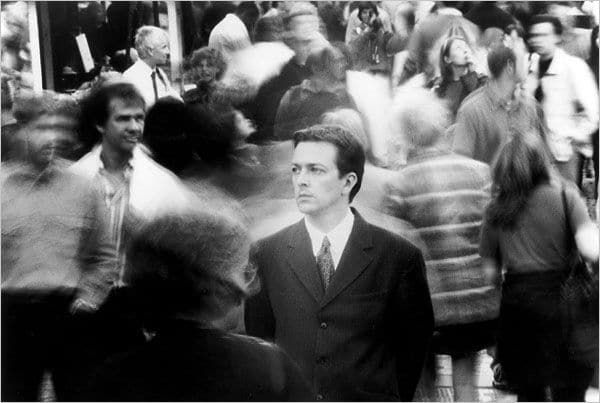 |
| Christopher Nolan's Following was originally passed over by Slamdance programmers... but went on to be selected when he resubmitted it |
This idea of putting the filmmaker first runs right through the festival, Baxter explains, from the way they programme it on up. Strict rules in the competition section - that films must be without distribution, have first-time directors and be made for less than $1million - ensure even the lowest budget films and most unknown filmmakers are in with a chance of success. Meanwhile, although most film events have dedicated programmers assigned to sections and who change from time to time, as a person moves on, or sometimes not at all for a long period, Slamdance operates in a slightly more egalitarian way by the sheer variety of people who are looking at the films.
All of them - and last year there were around 60 - are "filmmakers of one stripe or another, typically Slamdance alumni". As Slamdance has an open-door policy for getting its alumni involved in future festivals, this means that the pool of those selecting movies is an ever-changing one - which can pay dividends for filmmakers. For example, back in the Nineties, the festival passed over The Dark Knight director Christopher Nolan's film Following. Because Slamdance have a policy of getting resubmitted films watched by a different set of programmers, he hit pay dirt the following year - and this year he will be the first recipient of the Slamdance Founder's Award, which will be given to him in a ceremony on January 18. This fluidity of programming certainly seems to help the filmmakers - and does the constant infusion of new blood in terms of alumni also help it to retain its energy levels?
"Yes, that's right," says Baxter. "Now we have a mixture of people who have been around the festival a long time and we have a lot of younger filmmakers as well. The other thing this means is that there is no fashion or style to our programming because we let the filmmakers decide themselves. They're coming from all walks of life with different experiences and that is what, in the end, gives this energy and this life to this festival. You're right, they are the life and soul of Slamdance, our programmers."
At the end of the selection process, those who have watched a certain number of films to qualify, gather in LA to make the final selection.
 |
| The First Season is among the first films to be distributed by Slamdance |
Park City is, for most of the year, a ski resort town and, because of that, there's not a huge amount of room to spare at the best of times. With Sundance and all that is associated with it, plus other smaller festivals including Tromadance arriving in town, there is pressure on space. Nevertheless, Baxter says being in Park City remains an important focus for filmmakers.
"It's a tough question to answer in many ways, because as Slamdance has grown we've got more and more submissions," he says. "We always say we want to create a level playing field for filmmakers and we think we do a pretty good job of that, but now it's really competitive to get into Slamdance because of the space that you're speaking about.
"We're headquartered in Treasure Mountain Inn, we have had second venues. But really what we think at the end of the day is most important is the size of Slamdance has actually really helped to create this community in the first place because it brings everybody together in this one place. So it means that filmmakers can get to know one another and it means that our team, our staff, our sponsors, industry members, really have an opportunity to connect properly. Whereas if the programme was spread out and was bigger, we would lose that - we would lose the essence really then of what Slamdance is possibly all about in that physical space."
But that's certainly not to say that the festival is standing still. Its screenplay competition - which offers all entrants constructive feedback - is now in its 19th year, while distribution arm Slamdance Studios is starting to release its first titles (including Stranger Things, Hybrid and The First Season). And Baxter recognises the importance of the online environment.
"I think that we will be seeing growth online, he says. "We started a distribution label and I think that Slamdance definitely needs to move into that arena to support the filmmakers that have been at Slamdance and maybe others that have not. I think that distribution and being able to sustain filmmaking is something that Slamdance has got to be interested in and involved with in its future. We've started that, we have a label and we've already had our first films which are being distributed. We were the first festival to do an online programme at the same time as the festival, with XBox, and that went very well and from that we've been able to do more things but I definitely see growth at Slamdance in that area. But we don't want to lose sight of January and how important being in Park City with a headquarters and that type of programme is. I think that will always remain."
It's arguable that Slamdance has had a positive effect on other festivals, too, including Sundance, which introduced its Next <=> section with a view to target ultra low-budget filmmakers that could be argued as a response to the fact that many smaller films were losing out. At the time of its creation in 2010, I asked Sundance director John Cooper about its creation and he told me: "[Trevor Groth and I said] 'You know, there's still some small films that it feels weird that they're not here. It feels weird that those filmmakers weren't given the opportunity to become part of this community.' Even though they are low-budget films and I know that not everyone is going to like them, we can find room for them. If we're here to serve the community, those three or four filmmakers should be here at this festival. So we started concocting this plan to carve out a section."
I suggest this acknowledgment of the lack of room might be, in part, due to the sucess of Slamdance when it comes to finding new talent - after all, the likes of Oren Peli (Paranormal Activity), Lena Dunham (Girls) and Sundance regular Lynn Shelton (Humpday) all first gained notice at the festival.
"I think that if that's the case, then that's really positive," says Baxter. "We actually just don't know. Though we have sort of put out the olive branch over the years, they haven't really responded. I think that as we go forward, it would be positive to have a closer relationship with Sundance, it's nice that you've mentioned that. I'd like to think that that was the case... and if it wasn't, still, that was a very positive move that Sundance made to recognise that section of their festival. But quite clearly if you just look at the number of submissions Slamdance receives and what that really represents within the Sundance programme, I think it's clear to us that you say how can you really programme all these new and exciting films that are coming up and now today, Slamdance is in a position where it receives more than 5000 films. We have around 100 films that we are showing this year. Can we show all this new and exciting talent? No we can't - we just can't do that."
Looking to the future, Baxter is also keen for there to be more collaboration between festivals. It's a growing trend, with San Sebastian and Zurich Film Festivals partnering on 'windows' from one another's programmes this year and the Basque country festival already partnering with the Berlinale on a Culinary Zinema strand. He thinks more festivals need to stop thinking of themselves as rival combatants.
"I think that festivals could do a lot more for their filmmakers if they started working together with other festivals and not act as their own islands," he says. "I know it's a very easy thing to say when a lot of festivals really struggle to put on their own event, let alone trying to support other festivals and be involved year round with them but I think that's an important change that could happen that would benefit filmmakers.
 |
| Oren Peli's Paranormal Activity first came to prominence at Slamdance |
And if there is one thing he could do with Slamdance going forward?
"I'd like it to continue - one step at a time and all that," he says. "I'd like to see it continue to develop in the way we are right now. We have a great office here. Just when you think you have a system in place which allows this democratic process to choose the films, it always takes work and we have more programmers now, of course. And I'd like to make sure that as we probably get more submissions that we continue to take care of that process. That's really important to us. But I'd also like to see us continue to grow, significantly really, online with our efforts in supporting the distribution of the films that we show and perhaps films that we don't show, in time, as well. So I'd like to see a broader support there of filmmakers who are interested in submitting to Slamdance, or have done, who may not be at the festival but we can help. But you have to use what I think we've created here, which is an authentic brand, if you like, which filmmakers want to get behind and want to feel part of. We've seen many online companies who have started similar things and many have failed. But I think you've got to create a very solid community around that to make it successful and we have to make sure that that happens."
Slamdance's anniversary consists of 93 films and the film festival will run from January 17 to 23. For further information and to book tickets, visit Slamdance.com.
Read what Peter Baxter said about the origins of Sundance and its founding ethos, here.





















